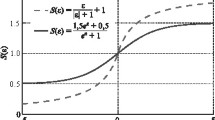Abstract
We consider the problem of optimal control of a linear time-invariant discrete-time system by inaccurate measurements of its output signals subject to guaranteed satisfaction of geometric constraints on the output signals. We study the case in which a minimal realization of the system in the state space is known and the case where the parametric model of the system is not known. A novel method is proposed for solving the problem in the case of an unknown model. The method is based on a single observed trajectory of the input and output signals of the system and allows omitting the stage of parametric identification of the system.



Similar content being viewed by others
REFERENCES
Hou, Z.-S. and Wang, Z., From model-based control to data-driven control: survey, classification and perspective, Inf. Sci., 2013, vol. 235, pp. 3–35.
Willems, J.C., Markovsky, I., Rapisarda, P., and De Moor, B.L.M., A note on persistency of excitation, Syst. Control Lett., 2005, vol. 54, pp. 325–329.
Berberich, J. and Allgöwer, F., A trajectory-based framework for data-driven system analysis and control, Eur. Control Conf. (St. Petersburg, Russia, 2020), pp. 1365–1370.
Berberich, J., Köhler, J., Müller, M.A., and Allgöwer, F., Data-driven model predictive control with stability and robustness guarantees, IEEE Trans. Autom. Control. https://doi.org/10.1109/TAC.2020.3000182
Berberich, J., Romer, A., Scherer, C. W., and Allgöwer, F., Robust data-driven state-feedback design. .
De Persis, C. and Tesi, P., Formulas for data–driven control: stabilization, optimality and robustness, IEEE Trans. Autom. Control, 2019, vol. 65, no. 3, pp. 909–924.
Romer, A., Berberich, J., and Köhler, J., and Allgöwer, F., One-shot verification of dissipativity properties from input-output data, IEEE Control Syst. Lett, 2019, vol. 3, no. 3, pp. 709–714.
Coulson, J., Lygeros, J., and Dörfler, F., Data-enabled predictive control: in the shallows of the DeePC, Eur. Control Conf. (Naples, Italy, 2019), pp. 307–312.
Gabasov, R., Dmitruk, N.M., and Kirillova, F.M., Optimal control of multidimensional systems based on inaccurate measurements of their output signals, Proc. Steklov Inst. Math. (Suppl.), 2004, no. 2, pp. S52–S75.
Kurzhanskii, A.B. and Vályi, I., Ellipsoidal Calculus for Estimation and Control, Nelson Thornes, 1997.
Balashevich, N.V., Gabasov, R., and Kirillova, F.M., The construction of optimal feedback from mathematical models with uncertainty, Comput. Math. Math. Phys., 2004, vol. 44, no. 2, pp. 247–267.
Dmitruk, N., Findeisen, R., and Allgöwer, F., Optimal measurement feedback control of finite-time continuous linear systems, IFAC Proc. Vols., 2008, vol. 41, no. 2, pp. 15339–15344.
Author information
Authors and Affiliations
Corresponding authors
Additional information
Translated by V. Potapchouck
Rights and permissions
About this article
Cite this article
Dmitruk, N.M., Manzhulina, E.A. Optimal Control of Linear Time-Invariant Discrete-Time Systems without Prior Parametric Identification. Autom Remote Control 83, 165–179 (2022). https://doi.org/10.1134/S0005117922020011
Received:
Revised:
Accepted:
Published:
Issue Date:
DOI: https://doi.org/10.1134/S0005117922020011




